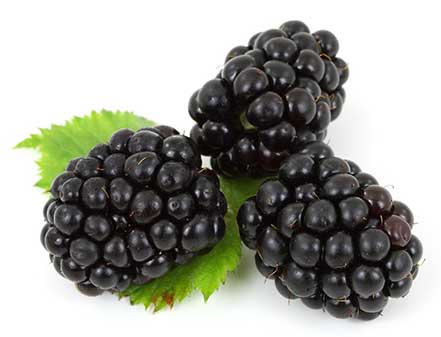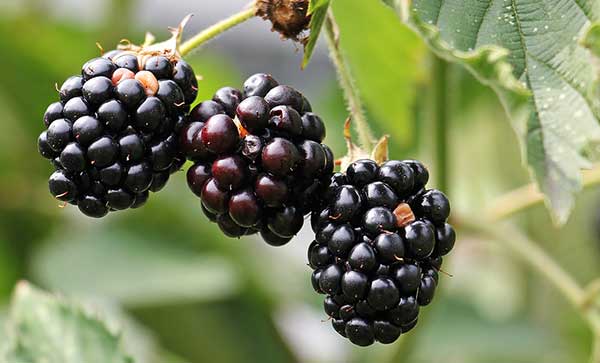Blackberries have always been lauded for their immense nutritional benefits.
Some of the important nutrients they contain include magnesium, calcium and potassium, as well as powerful antioxidants such as anthocyanins that are significant in fighting free radicals.
In addition, blackberries are also a rich source of Vitamin A, most B vitamins as well as vitamins C and E.
Collectively, these nutrients contribute to an increased brain activity, supports our oral health and improves our digestive systems.
Obviously, there are so many ways we can benefit from eating blackberries.
However, can our feline friends enjoy these benefits as well? Can cats eat blackberries? This question shall form the focus of this article, so read on to find out.
Table of Contents
Feline Diet
Like humans, our furry friends require a balanced diet. However, it is important to remember that cats do not eat fruits, less so those that grow naturally in the wild.
Therefore, their feeding instincts are not wired to eat blackberries. However, you can easily introduce blackberries into the diet of your pet cat.
Introducing blackberries into your cat’s diet should not be a difficult task. Contrary to what many pet owners think, cats are not exclusively carnivores.
Cats lead a shadier and elusive lifestyle and once in a while, they do just fine munching on vegetation. It becomes even easier for domesticated cats that might already have been introduced to fruit and vegetable diets.
But, Can Cats Eat Blackberries?
The answer is a conditional “yes”. As we have already mentioned, blackberries come with a wide range of health benefits.
First and foremost, blackberries are known to be significantly low in fat and calories. Therefore, adding it to your cat food will go a long way in helping your pet keep a lean weight.
Cats, like humans, suffer weight- and calorie-related medical conditions such as diabetes, heart disease and hypertension. As such, feeding foods rich in high fat and calories may do them more harm than good.
Thankfully, blackberries are some of the fruits you can seamlessly feed to your feline without worrying about it developing any of the conditions mentioned above.
Blackberries are also instrumental in boosting your cat’s immune system. As we have already mentioned, these fruits pack essential vitamins such as vitamins A, B, C, E and K, as well as highly-resourceful minerals such as potassium and iron. These all work together to boost your cat’s immune system.

They will become less susceptible to feline infections and will have a remarkably radiant coat. The antioxidants found in blackberries will especially help your feline cat keep cancer at bay.
As blackberries are a high-fiber fruit, they will also help improve your cat’s digestive system. Adding blackberries to the cat’s diet will help relieve symptoms of indigestion such as bloating, abdominal pains and constipation. In turn, the cat will have a more regular bowel activity.
The high fiber-content in blackberries will also help reduce cholesterol in your cat, regulate blood sugar levels and make them feel fuller for a much longer duration, advantages that all tie back to the weight loss properties of this fruit.
What Are The Potential Risks? Will Blackberries Hurt Cats?
Having discussed all the possible benefits of introducing blackberries into your feline’s diet, you probably are wondering to yourself, “can cats have blackberries all the time?” Well, not quite.
According to ASPCA, blackberries have been repeatedly mentioned as one of the fruits that could be potentially deadly if served to animals.
Well, some research studies have sought to debunk this narrative, claiming the risks are not so much linked to ingesting blackberries. Instead, they are linked to the fruit possibly choking your cat or getting lodged in its nasal passage.
However, you still need to be very wary of feeding blackberries to your cat, and here’s why.

Cats are known as obligate carnivores. This means their diet primarily consists of meat. So, meat supplies your cat with all the essential minerals it might require. Blackberries, though may come with many additional health benefits, should be added just as a treat.
This presents another risk. Since the digestive system of your cat may not be accustomed to foreign food substances such as blackberries, it may be less effective at digesting and assimilating them.
As such, the fruit could end up causing stomach upset, abdominal pains and other symptoms of indigestion, instead of alleviating them. If not treated with urgency, the blackberry could lead to diarrhea and vomiting.
Another common threat with blackberries is that the fruits are naturally resilient. Not only are they drought-resistant but also resistant to various plant diseases. It gets worse if the fruit was grown under conditions of extreme pesticides exposure.
What this means is that a typical blackberry could contain lots of chemical remnants. When ingested whole, these chemicals could lead to chemical intoxication. If unchecked, your pet cat could end up suffering from cancer.
Are Blackberries Poisonous For Cats?
Well, the answer will depend on a few considerations. Serving blackberries to your cat in small, checked quantities might not pose any serious health problems to them.
However, the problem comes in when you offer the fruit to them in large quantities and more frequently.
It is important to remember that though cats may occasionally munch on fruits and veggies, they still remain obligate carnivores. As such, fruits like blackberries remain foreign substances that should be introduced in small quantities.
Carefully monitor how your furry friend responds to a new blackberry diet. If she shows instant aversions, withdraw the fruit from its diet immediately.

Due to their curiosity, cats may immediately be taken by blackberries. However, that’s still not a licenses to offer the fruit freely to them. As soon as you are sure they have gotten enough of the fruit, remove it from your cat’s diet and feed them what they are used to.
Another thing to take care of is that the fruit should be fresh and thoroughly washed. This is important in getting rid of any dirt and chemical toxins that may adversely interact with your cat’s digestive system.
Of course, this should be a no-brainer, as you would also wish to eat a fresh and clean fruit yourself. So, why not exercise the same precautions when offering it to your cat?
Last but not least, the form in which blackberries are served also determine whether your cat can eat blackberries, and in what quantities. Which brings us to the question…
Can Cats Eat Blackberry Yogurt?
This could be a potentially double tragedy, since most cats are also known to be lactose intolerant.
However, cats can eat yogurt without any problems. Giving your feline friend small amounts of blackberry yogurt should not cause any problem either.
Yogurt is much easier to your cat to digest compared to other dairy products.
Just remember that yogurt also contains a lot of natural sugar and consuming too much of it may cause your cat to experience digestive problems like stomach upsets and diarrhea, therefore give only small portions to your cat as occasional treat once in a while.
How Many Blackberries Can A Cat Eat?
Blackberries do have some health benefits, However, remember that cats are carnivorous animals and they do not eat vegetables and fruits.
? Therefore moderation is the key and you should not give your feline friend more than one or two blackberries from time to time as a treat.
If you feed them more than 2-3 pieces at a time it could lead to digestive problems and an upset stomach.
Conclusion: Can Cats Eat Blackberries?
Yes they can, in small quantities.
Most importantly, ensure you serve them fresh and clean blackberry. Check how she responds and use your best judgment in determining the proportions to include in her diet.
If she shows extreme symptoms of aversion, consult your vet before introducing blackberries to your cat.


